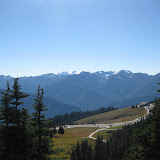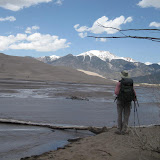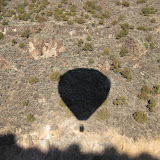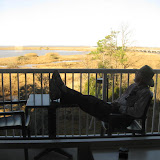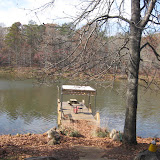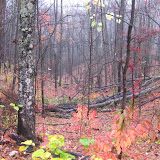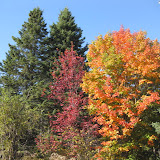by Ted L. Cox
We struggle toward wisdom with the two essential impediments of magic and madness. We cannot even survive, let alone make progress toward wisdom, without some modicum of magic in our lives; without some enchantment, which might be the main difference between us and the other animals. The nearly universal form that this magic takes is religion. It is possible to live within a religious context and be totally immersed in magic; religion as bargain with some imagined omnipotent and omniscient parent figure where worship is felt to be an exchange for a magical share in power, knowledge and immortality. This practice can probably be traced back to our discovery early on that we could ingratiate parents or caregivers by "worshipping" them. Hence, the tradition of the "offering." This first "offering" experience may be when the baby gives a smile, and learns that this gratifies his caretakers. This is possibly our first taste of power. Nervous people, including myself, smile a lot, trying to gain some power. But it is also possible, as one of my heroes, Ralph Waldo Emerson did, to live within a religious context and still abjure magic and focus the whole life on spiritual growth, independence, and wisdom. We might say Emerson was enchanted by nature, as am I, but nature is a good antidote to magic. The random tragedy found in nature has only to be recognized and accepted as also a primary ingredient in human life in order to adjust one's life in the direction of reality and hence to facilitate the pursuit of wisdom. Emerson`s first essay, published anonymously in 1836, was entitled "Nature."
Emerson`s attitude toward the magical aspects of religion is exemplified in his first break with the Unitarian Church in 1832. This came about largely because of his rejection of the ritual of holy communion. This is possibly the most magical part of many protestant and catholic churches: We eat bread and drink red wine (or red grape juice) which has been magically transformed into the real body and blood of Jesus Christ. A magical, pagan ritual if ever there was one. Some would argue that the bread and wine are only symbols, but still.... So Emerson removed himself from this magical aspect of religion and focused instead on the spiritual dimensions of life. In my vocabulary, he rejected the magic/power struggle which so often overwhelms our lives and embraced the pursuit of truth (work in progress).
This brings us close to the second element in this "slow cooker" stew we call human experience. Madness is the risk we run in a life with minimal magic and a struggle toward wisdom. Sadly, many are simply not equipped for the struggle; whether by dent of heredity or environment is irrelevant here. Those who can should and must take the responsibility for the continuing struggle. Emerson, however, was strong in his belief in the ability of all to contribute useful knowledge or "stories." Perhaps the jazz musician who successfully combines tragedy and whimsy is a good example of those possibly lacking in formal education but still very much in the forefront of the pursuit of wisdom. They help us to see and feel that tragedy does not necessarily blot out the humor in life. Or take the many great story-tellers throughout history like Homer who passed on the myths of magic and power that gave comfort and a sense of understanding the rhythms of life without binding the mind to any narrow way of thinking. Come to think of it, I guess we are all story-tellers in as much as the way we live our lives depicts our understanding and belief in the things that sustain us. It is not necessary to write your story unless you are striving for some little corner of immortality (as am I). We all live our story; not in so many words but in looks, gestures and attitudes toward others and particularly toward power and truth in general. I was deeply affected by the lives of my three consecutive black nurse-maids that loved me in an open and caring fashion which I never experienced within my own family. They lacked formal education but were great "story-tellers." They conveyed to me a story by their presence that I would never have "heard" otherwise. In a sense, we tell each other stories in order to stave off the threats of madness. We are all "nervously loquacious at the edge of an abyss."
Sanity is never a "given" in society for any of us, although we comfort ourselves with the belief that it is. Sanity is always precarious in society. If you have any doubts, try spending a night in a police station or mental hospital. We have evolved various means to ensure its dominance. The police keep the "crazies" off the street; though many would not agree with how the police label and scapegoat. Scapegoating is an old tradition and one quite effective in eliminating threats to social belief systems which, in essence, protect the group "sane" functioning. The Spanish Inquisition could be considered one example of keeping a population in line with the beliefs of the time. And Socrates; he was not sentenced to death - he was sentenced to exile or death and he chose death rather than to be scape goated in the more traditional sense. Sanity is understood here to mean that one subscribes to the dominant magical persuasion of a society and hence is able to function effectively therein. The less you believe in the dominant myths of your society, the more difficult it is to function there. Emerson did this with his belief in God but went far beyond the magical dimension of his time to probe wisdom in a way that is still enlightening for us today some 160 years later. (He wrote an essay on Socrates while at Harvard.) Society also exercises some control by various informal contracts with the "gatekeepers" of information and entertainment. For instance, the Catholic newspaper used to print nothing but good news. And, when the U.S. was entering a war, the movie industry asked then President Johnson if he wanted them to "beat the war drums" and he said, much to his credit, no. Beating the war drums in this case referred to making movies which glorify war which tends to make young people volunteer for the military and old people complain less about taxes.
Now that I have made at least a tentative distinction between magic and madness I will proceed to confuse the issue by describing situations in which they are both present. The megalomaniacs, those who believe they are god or Jesus or Mary, combine a magical conviction with their madness. But there are many variations on this theme. Many politicians, for instance, manage to manufacture charisma, creating the illusion of love for people, while at the same time lying to and exploiting their public. They are not condemned as crazy but, instead, given positions of enormous power and responsibility; with sometimes disastrous consequences for society. It seems that voters, if they cannot have the mad, magical/religious power themselves, are willing to celebrate it in another as substitute: vicarious satisfaction. No wonder we are merciless in our criticism of leaders when they are proven by time to be fallible and perhaps a bit mad, just like the rest of us. Pathological liers are another example: they are able to lie so convincingly because they have a magical/religious belief in their stories while they are telling them. They are story-tellers gone too far toward madness. William Faulkner, that great Southern story-teller, was known to be a great liar. He used to lay flowers periodically on the grave of his black nursemaid. Perhaps that initial experience of black love gave us both the courage to think independently. However, an over-dose could easily lay the ground-work for a person with a great difficulty in recognizing and accepting the tragedy inherent in life. A propensity to fabricate and distort reality to make it more palatable could easily follow. At a certain point or line, one crosses over to pathological liar and madness. The Road Less Travelled by Scott Peck was a wonderful spiritually uplifting book but the sequel was soaked with magic
Madness could even be considered a prerequisite for popularity. A look at the cast of popular characters in the U.S. reveals an interesting consistency. None expresses self-doubt. To the contrary, the most popular are usually those with an overpowering self confidence and optimism. Opphra Winfred comes to mind. They believe in their own charisma. I suggest this is madness. One must be sealed off from reality in order to manufacture such a belief. Sometimes the cost of this performance is continuous drugs as with Michael Jackson. Or take a look at the long list of drug addicted and/or alcoholic movie stars, politicians and their spouses. Sadly, in a way the "sane" public demands these sacrificial lambs in order that the public may experience vicariously a life without doubt. For we are all plagued by doubt: self-doubt, doubt about the sincerity and commitment of others, doubt about financial concerns and the future in general. So we honor and celebrate (as in celebrities) those who can manufacture the aura of confidence, or give a convincing performance, that makes us feel better. No thought is given to the sacrifice they make or the cost in terms of damaged lives of family members. Part of the requisite for fame is that it appears easy and natural. So they are not even allowed to complain. For more on this see "In the Shadow of Fame," by Sue Blolland.
So, small wonder that society's progress toward wisdom is slow. We must navigate the perilous waters between the Scylla and Charibdis of magic and madness in order to penetrate some of the mysteries of the human condition. If we venture too far into reality, without some anchors in enchantment, we may stray so far outside the accepted norms as to be dismissed by society as crazy; and by that time we may well be. On the other hand, if we stay anchored too firmly in magic and religion, we will be blinded to the truth by our own vested interest in the comfort of our enchantments. Our system of education seldom provides an antidote to this situation. In my experience, there is a tendency for professors and teachers in general, to create an implicit and probably unconscious bargain with students as follows: If you worship me or confirm my exaggerated sense of my own importance, I will certify you as smart. So by the time a student is finished with an educational experience, he or she knows very well how to "believe" in whatever is beneficial to his or her own sense of omnipotence/omniscience but has made very little progress toward an encounter with wisdom. To the contrary, students learn how to fabricate a reality that is false but beneficial to their own imagined and probably magical, power. Hence, Emerson expects more from "those classes whose minds have not been subdued by the drill of school education." He seemed to think we would do better reading the great thinkers by ourselves and thinking about wisdom on our own; listening to the voice within. Of course, then the individual lacks institutional approval and therefore will have a difficult time obtaining social recognition. Emerson himself was ordained as a minister (1829) before he became such an iconoclast and as mentioned above, published his first essay in 1836 anonymously. But, in 1838 he delivered an address at the Harvard Divinity School that was critical of other Unitarian ministers of his time leading to his final break with the church. He was not invited back for the next 30 years. He did become popular as a speaker around the world and eventually when returning to his home town of Concord, Mass. in 1873 after a vacation, the whole town turned out to welcome him; a fitting tribute to an almost fearless seeker and speaker of wisdom. And, some of his quotes have a definite "focusing" ring to them. For instance; "Let us be silent for so are the Gods," sounds a lot like my sense of focusing: Be still in order that you may hear what your inner feelings have to say to you. Or, Emerson again; "each of us must obey the divine voice within himself or herself."
It could easily be presumed from the foregoing that there is some intellectual/emotional plateau that could be achieved where one could operate continuously with wisdom. Nothing could be further from the truth, as I understand/feel it to be. Again, Emerson was way ahead of us in this regard. In his lecture entitled "The Transcendentalist" he refers to the class of those who "wish a just and even fellowship or none" and hence spend much time in solitude. " When I asked them concerning their private experience, they answered somewhat in this wise: It is not to be denied that there must be some wide difference between my faith and other faith; and mine is a certain brief experience, which surprised me on the highway or in the market, in some place, at some time --- whether in the body or out of the body, God knoweth --- and made me aware that I had played the fool with fools all this time, but that law existed for me and for all; that to me belonged trust, a child's trust and obedience, and the worship of ideas, and I should never be fool more. Well, in the space of an hour, probably, I was let down from this height; I was at my old tricks, the selfish member of a selfish society. My life is superficial, takes no root in the deep world; I ask, When shall I die, and be relieved of the responsibility of seeing a Universe which I do not use? I wish to exchange this flash-of-lightening faith for continuous daylight, this fever-glow for a benign climate. These two states of thought diverge every moment, and stand in wild contrast."
Notice how Emerson begins by referring to others (third person) in this paragraph but ends with a more honest opinion phrased by his own experience (first person). And so it is still today, I/we struggle to pursue wisdom but fall often into the trap of selfish social enchantments and even madness. I feel a part of myself sometimes blasting through all my good intentions with an overwhelming desire to be pitied and loved more than anyone else. I take this to be a common yearning among us. It is reflected in the Protestant hymn sung in many churches about walking in the garden with Jesus: "And the joy we share as we tarry there, none other has ever known." Thus the idea is expressed without apparent awareness of the contradiction - that all singing the song might be enjoying the presence of Jesus in a way that none of the others could. This is the difficult framework within which we try to plot a course toward wisdom.
So just what is this wisdom that I refer to? I'm afraid I cannot give a definition. It is another quandary that goes with being human. Perhaps, as Emerson suggests, it is unique to each individual; something that each individual must divine by listening to the small, quiet voice within. There are few absolutes in this business of being a curious human. And why not just be selfish and concentrate on the accumulation of wealth and power? I believe that this course of action, especially over time, builds a wall between self and others such that the person can no longer (if they ever could) feel the presence of others or their own deep yearnings. Likewise, feeling the natural world we live in becomes difficult. This separation and sense of a missed opportunity is well described in Tolstoy's short novel: The Death of Ivan Ilyich. Tolstoy himself attempted to give away his worldly possessions late in his life. Was he mad by then? But self-abnegation doesn't work well either. For my own sense of wisdom, I feel we have responsibilities to self, others, family, community and society. Some social and private resources must be invested in the development of intellectual potential so that society is better prepared for upcoming problems. Put another way, if all social resources went to feed, house and care for the population there would be no progress in science, medicine or possibly philosophy. Perhaps it is a question of balance. One must protect the welfare of family, community and society but still devote some private and social resources to those less fortunate.
One thing seems clearer to me: the pursuit of wisdom is facilitated with the recognition and acceptance of the limitations imposed by the necessary impediments of magic and madness. If we can manage to operate consciously within those boundaries we are more likely to arrive at approaches to both individual and social problems which will have some measure of efficacy and lead eventually (if not in our lifetime then in the future) to societies that function so as to give each individual (for in the final analysis the individual is the ultimate measure of success) the opportunity for a full and robust spiritual experience of self, other and nature. Wisdom, as applied to decision-making implies we should gather all the pertinent facts, examine all possible consequences for alternatives and make choices based on the common good, not on any single individual (including the self), and do this as much as possible free from the bias of magic and madness. Wìsdom as applied more generally to life implies our responsibility to nature: taking care of the natural world we have inherited and of our own natural bodies, this precious miracle we are privileged to experience for some brief period of time.
One word of caution: If you are on this course toward wisdom, or making plans to do so, try to stay close to someone. I find the equilibrating power from outside which is provided by an open, honest and intimate relationship with another to be the keystone in keeping my life on course and avoiding the extremes of magic and madness. And, coincidentally, by avoiding magic and madness I find I am more open to the other than ever before.
A sense of humor comes in handy at this point. This business of being human could be considered a jazzy kind of quandary. We know there is a better way to live life but we are unable to grasp it; to hold it close over time; to "own it." And in a way, that's funny. But in a larger sense it is perhaps more important that we experience the idea of infinite love and compassion (call it what you will.... wisdom, divine insight perhaps) and in this way we keep it alive - no matter how brief the encounter. And hopefully over time our society will be able to know it better, to hold it longer, and more people will be able to experience it... to share it. It is difficult to sail that jazzy course in-between magic and madness.
Notes: For those not familiar with Greek mythology, the Scylla and Charibdis referred to above relate to the voyages of Ulysses after the conclusion of the Trojan war. He and his men were forced to sail their vessel in-between two great perils. One was a giant whirlpool which could suck whole ships down to the bottom of the sea and almost adjacent to this was the cave of a man-eating monster who snapped up one of Ulysses' men as he made the passage. Also, quotes and comments regarding Emerson are from: Self Reliance; the Wisdom of Ralph Waldo Emerson: by Richard Whelan (1991: Three Rivers Press; New York). For more information on Focusing, visit focusing.org. For more on the cost of fame, see: In the Shadow of Fame, by Sue Bloland. The subtitle above: Travels with Emerson, is a take-off on Steinbeck`s last novel: Travels with Charlie, in which he describes his pickup truck travels around the U.S. with his dog Charlie. Emerson is with me in spirit as Diane and I travel around North America in our pickup truck. The reference to "nervously loquacious" refers to the brief poem entitled `Huddling`already on this blog.
Saturday, February 27, 2010
Subscribe to:
Comments (Atom)


